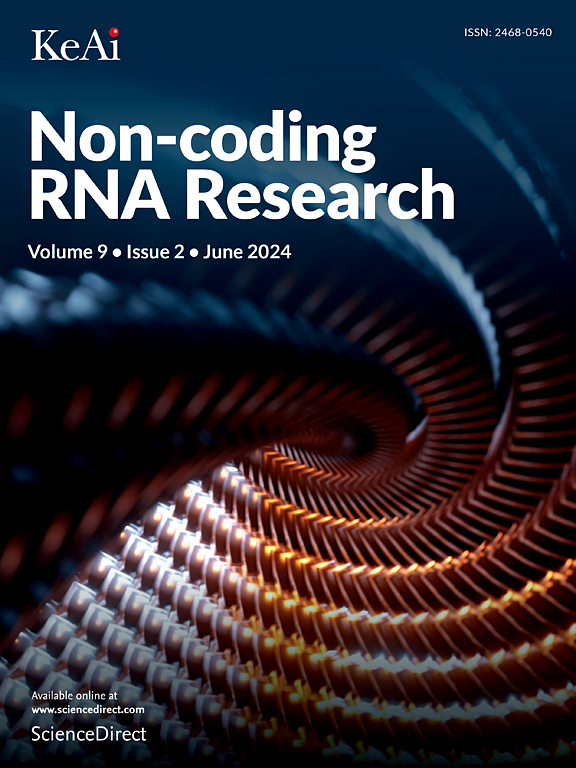Long non-coding RNA ANRIL/p65 negative feedback loop protects intestinal barrier function in inflammatory bowel disease
IF 5.9
3区 生物学
Q1 BIOCHEMISTRY & MOLECULAR BIOLOGY
引用次数: 0
Abstract
Patients with inflammatory bowel disease (IBD) demonstrate varying expression levels of long non-coding RNAs (lncRNAs) in their intestinal mucosa, which can potentially impact the function of the intestinal barrier. This impact may occur through the modulation of epithelial cell apoptosis, alteration of intestinal mucosal barrier permeability, and enhancement of inflammatory responses. The objective of this study was to explore the role and underlying mechanisms of the downregulated lncRNA ANRIL in modulating intestinal barrier function in IBD. Notably, ANRIL was found to be significantly downregulated in patients diagnosed with ulcerative colitis (UC), correlating strongly with disease progression. The overexpression of ANRIL in mice treated with dextran sulfate sodium (DSS) resulted in a significant reduction in colonic damage. This was accompanied by the suppression of pro-inflammatory cytokines such as IL-6, TNF-α, and IL-1β, and an improvement in intestinal barrier function. Transcriptome sequencing following overexpression of ANRIL revealed a significant enrichment of the NF-κB signaling pathway. In both DSS-induced mouse colitis and LPS-induced FHC cell models, the upregulation of ANRIL effectively suppressed the activation of the NF-κB pathway. Furthermore, our findings demonstrated that ANRIL competes with YY1 for binding, thereby inhibiting the interaction between YY1 and p65 subunit of NF-κB. This disruption in interaction results in the suppression of transcriptional activation of NF-κB p65, leading to a reduced expression of inflammatory cytokines and the promotion of intestinal barrier function in IBD.Additionally, we identified a negative feedback loop involving ANRIL and p65, wherein p65 binds to the ANRIL promoter, promoting ANRIL expression. In summary, the ANRIL/p65 negative feedback loop represents a potential therapeutic target for protecting intestinal barrier function in IBD.

长链非编码RNA ANRIL/p65负反馈环在炎症性肠病中保护肠屏障功能
炎症性肠病(IBD)患者在肠黏膜中表现出不同水平的长链非编码rna (lncRNAs)表达,这可能会影响肠屏障的功能。这种影响可能通过调节上皮细胞凋亡、改变肠粘膜屏障通透性和增强炎症反应而发生。本研究的目的是探讨lncRNA ANRIL下调在IBD中调节肠屏障功能的作用和潜在机制。值得注意的是,ANRIL在溃疡性结肠炎(UC)患者中被发现显著下调,与疾病进展密切相关。用硫酸葡聚糖钠(DSS)处理小鼠后,ANRIL过表达可显著减轻结肠损伤。这还伴随着IL-6、TNF-α和IL-1β等促炎细胞因子的抑制,以及肠道屏障功能的改善。ANRIL过表达后的转录组测序显示NF-κB信号通路显著富集。在dss诱导的小鼠结肠炎和lps诱导的FHC细胞模型中,ANRIL的上调均能有效抑制NF-κB通路的激活。此外,我们的研究结果表明,ANRIL与YY1竞争结合,从而抑制YY1与NF-κB的p65亚基之间的相互作用。这种相互作用的破坏导致NF-κB p65转录激活的抑制,导致炎症细胞因子的表达减少,促进IBD肠道屏障功能。此外,我们发现了一个涉及ANRIL和p65的负反馈回路,其中p65与ANRIL启动子结合,促进ANRIL的表达。综上所述,ANRIL/p65负反馈回路代表了保护IBD肠道屏障功能的潜在治疗靶点。
本文章由计算机程序翻译,如有差异,请以英文原文为准。
求助全文
约1分钟内获得全文
求助全文
来源期刊

Non-coding RNA Research
Medicine-Biochemistry (medical)
CiteScore
7.70
自引率
6.00%
发文量
39
审稿时长
49 days
期刊介绍:
Non-coding RNA Research aims to publish high quality research and review articles on the mechanistic role of non-coding RNAs in all human diseases. This interdisciplinary journal will welcome research dealing with all aspects of non-coding RNAs-their biogenesis, regulation and role in disease progression. The focus of this journal will be to publish translational studies as well as well-designed basic studies with translational and clinical implications. The non-coding RNAs of particular interest will be microRNAs (miRNAs), small interfering RNAs (siRNAs), small nucleolar RNAs (snoRNAs), U-RNAs/small nuclear RNAs (snRNAs), exosomal/extracellular RNAs (exRNAs), Piwi-interacting RNAs (piRNAs) and long non-coding RNAs. Topics of interest will include, but not limited to: -Regulation of non-coding RNAs -Targets and regulatory functions of non-coding RNAs -Epigenetics and non-coding RNAs -Biological functions of non-coding RNAs -Non-coding RNAs as biomarkers -Non-coding RNA-based therapeutics -Prognostic value of non-coding RNAs -Pharmacological studies involving non-coding RNAs -Population based and epidemiological studies -Gene expression / proteomics / computational / pathway analysis-based studies on non-coding RNAs with functional validation -Novel strategies to manipulate non-coding RNAs expression and function -Clinical studies on evaluation of non-coding RNAs The journal will strive to disseminate cutting edge research, showcasing the ever-evolving importance of non-coding RNAs in modern day research and medicine.
 求助内容:
求助内容: 应助结果提醒方式:
应助结果提醒方式:


